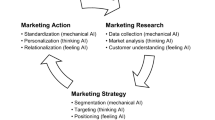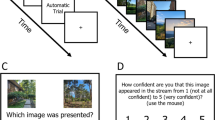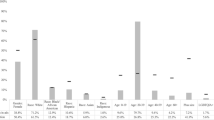Abstract
This paper contrasts the effects of competitive clutter on the recall and recognition of information from ads for familiar brands. An experiment was conducted utilizing ads for the type of relatively familiar brands typically advertised on network television; the dependent variables were recall and recognition of brand names and ad claims. Results showed that brand name recall scores were substantially reduced by competitive clutter. However, exposure to competitors' ads had little effect on ad claim recall. These data are consistent with the view that information about familiar brands will tend to be compartmentalized in memory, reducing interference effects in attribute recall. Exposure to competitive clutter had relatively little effect on recognition task performance. Suggestions for future advertising research considering competitive interference and brand familiarity issues are provided.
Similar content being viewed by others
References
Alba, Joseph W., and J. Wesley Hutchinson. (1987). “Dimensions of Consumer Expertise,”Journal of Consumer Research 13 (March), 411–453.
Burke, Raymond R., and Thomas K. Srull. (1988). “Competitive Interference and Consumer Memory for Advertising,”Journal of Consumer Research 15 (June), 55–68.
Keller, Kevin Lane. (1987). “Memory Factors in Advertising: The Effect of Advertising Retrieval Clues on Brand Evaluations,”Journal of Consumer Research 14 (December), 316–333.
Keller, Kevin Lane. (1991). “Memory and Evaluation Effects in Competitive Advertising Environments,”Journal of Consumer Research 17 (March), 463–476.
Kent, Robert J. (in press). “Competitive versus Noncompetitive Clutter in Television Advertising,”Journal of Advertising Research, forthcoming.
Lipman, Joanne. (1990). “Too Many Think the Bunny Is Duracell's, Not Eveready's,”The Wall Street Journal, July 31, B1.
Lynch, John G., and Thomas K. Srull. (1982). “Memory and Attentional Factors in Consumer Choice: Concepts and Research Methods,”Journal of Consumer Research 9 (June), 18–37.
Machleit, Karen A., Chris T. Allen, and Thomas J. Madden. (in press). “The Mature Brand and Brand Interest: An Alternative Consequence of Ad-Evoked Affect,” forthcoming inJournal of Marketing.
Pryor, John B., and Thomas M. Ostrom. (1981). “The Cognitive Organization of Social Information: A Converging-Operations Approach,”Journal of Personality and Social Psychology 41:4, 628–641.
Postman, Leo. (1976). “Interference Theory Revisited.” In John Brown (ed.),Recall and Recognition. London: Wiley.
Singh, Surendra N., Michael L. Rothschild, and Gilbert A. Churchill, Jr. (1988). “Recognition Versus Recall as Measures of Television Commercial Forgetting,”Journal of Marketing Research 22 (February), 72–80.
Smith, Robert E., and Laura M. Buchholz. (1991). “Multiple Resource Theory and Consumer Processing of Advertisements: An Involvement Perspective,”Journal of Advertising 20:3, 1–8.
Srull, Thomas K. (1983). “The Role of Prior Knowledge in the Acquisition, Retention, and Use of New Information.” In Richard P. Bagozzi and Alice M. Tybout (eds.),Advances in Consumer Research Volume 10. Ann Arbor, MI: Association for Consumer Research, 572–576.
Srull, Thomas K., and Julianne F. Brand. (1983). “Memory for Information About Persons: The Effect of Encoding Operations on Subsequent Retrieval,”Journal of Verbal Learning and Verbal Behavior 22, 219–230.
Stewart, David W. (1992). “Speculations on the Future of Advertising Research,”Journal of Advertising 21 (September), 1–17.
Author information
Authors and Affiliations
Additional information
The authors thank the editor and two anonymous reviewers for their guidance. Ray Burke. Frank Kardes, James Kellaris, Karen Machleit, Joe Mandese, and Don Schumsky provided helpful comments on various aspects of this research.
Rights and permissions
About this article
Cite this article
Kent, R.J., Allen, C.T. Does competitive clutter in television advertising “interfere” with the recall and recognition of brand names and ad claims?. Marketing Letters 4, 175–184 (1993). https://doi.org/10.1007/BF00994075
Issue Date:
DOI: https://doi.org/10.1007/BF00994075




